Table of Contents
This is where managed e-commerce hosting enters the picture. This isn’t the $5-per-month shared hosting your cousin uses for his-person blog. Managed hosting is a premium service where the provider handles the complex, technical side of running a high-performance website. This includes security, speed optimization, updates, backups, and crucial scalability. For an e-commerce store, this service is not a luxury. It is a fundamental requirement for success.
As website expert Itamar Haim often notes, “Your hosting is the digital foundation of your business. In e-commerce, a weak foundation doesn’t just crack; it collapses.” In 2026, customer expectations are higher than ever. A one-second delay in page load can lead to a significant drop in conversions. This is why choosing the right host is one of the most important strategic decisions you will make for your online business.
Key Takeaways
- Hosting is a Service, Not a Commodity: Managed e-commerce hosting is a non-negotiable service for any serious online store. It handles all technical server management, security, and performance optimization, freeing you to focus on growing your business.
- Performance is Profit: The best providers for 2026 use a combination of server-level caching, a global Content Delivery Network (CDN), and the latest hardware (like Google Cloud C2/C3 machines) to deliver sub-second load times.
- The Ecosystem is Everything: The biggest trend is the shift from simple hosting to an integrated web creation platform. The “best” host is the one that works seamlessly with your entire tech stack.
- An Optimized Stack Wins: For the millions of stores built with Elementor, Elementor Hosting provides a complete, all-in-one ecosystem. It bundles the Elementor Pro plugin and its powerful WooCommerce Builder directly with premium, optimized hosting, creating a single, seamless environment for building and managing a store.
- Specialization Matters: While some hosts are great all-rounders, providers like Nexcess offer deep, purpose-built features for WooCommerce. Others, like Kinsta and WP Engine, focus on premium, high-traffic performance.
How We Chose the Best E-commerce Hosting
To cut through the marketing noise, we based our rankings on the criteria that directly impact your store’s performance and profitability:
- Performance & Speed: We looked at the underlying technology. Does the host use Google Cloud or AWS? Do they offer modern tech like LiteSpeed servers, server-level caching, and a premium CDN?
- E-commerce Specific Features: We prioritized hosts that are built for e-commerce. This includes features like automatic scaling for traffic spikes, server-level WooCommerce optimizations, and one-click staging environments.
- Security: A breach can destroy an e-commerce business. We selected hosts with proactive security, including a Web Application Firewall (WAF), free SSL, automatic malware scanning, and free cleanup services.
- Scalability: The right host should grow with you. We analyzed how easily you can scale server resources (like RAM and CPU) as your traffic and order volume increase.
- Support: When your store is down, you are losing money. We favored hosts with 24/7, expert support from technicians who understand the complexities of e-commerce.
The 9 Best Managed E-commerce Hosting Providers for 2026
1. Elementor Hosting
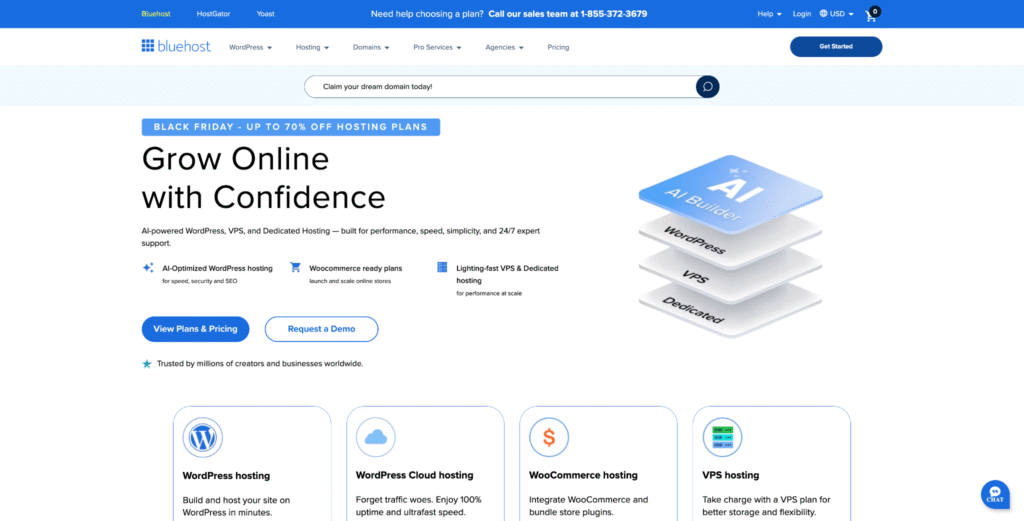
Elementor Hosting is the definitive answer to the “builder vs. platform” debate. It provides the seamless, integrated experience of a SaaS platform while retaining the full power, flexibility, and freedom of the WordPress ecosystem. It is engineered from the ground up to be the single best foundation for any website built with Elementor, especially e-commerce stores.
This solution directly addresses the main friction point for web creators: fragmentation. Instead of buying a builder here, hosting there, and security plugins from somewhere else, Elementor Hosting bundles the entire professional toolkit into one managed plan.
Key E-commerce Features
- Elementor Pro Included: Every e-commerce hosting plan includes the full Elementor Pro plugin. This gives you immediate access to the powerful Elementor WooCommerce Builder.
- Premium Google Cloud Infrastructure: Your site runs on the best. Elementor Hosting uses Google Cloud’s C2 machines, ensuring top-tier speed and reliability.
- Cloudflare Enterprise CDN: This is not a standard free CDN. The Enterprise-level CDN provides an unparalleled global network for speed, along with a managed WAF and DDoS protection.
- Integrated Toolkit: The Ecommerce Hosting plans also bundle the Image Optimizer plugin and the Site Mailer plugin, solving image compression and transactional email reliability in one go.
- Unified Support: Because Elementor builds the builder and runs the hosting, there is no “blame game.” You have one team of experts to solve any issue, from plugin settings to server performance.
- One-Click Staging: Safely test new products, plugins, or design changes in a staging environment before pushing them to your live store.
Why It’s Great for E-commerce
Elementor Hosting’s primary advantage is its deep, native integration. When you use the Elementor WooCommerce Builder, you can design every part of your store, from the product page layout to the checkout.
Having your hosting on the same platform means the entire stack is optimized for this workflow. The servers are tuned for Elementor’s code, the caching works perfectly with its widgets, and the security rules are written to protect it.
It also plugs you into the wider Elementor ecosystem, which includes cutting-edge tools like the AI Site Planner for mapping out your store’s structure and Elementor AI for writing product descriptions. This “best of both worlds” approach gives you the power of WordPress with the simplicity of a fully managed, all-in-one solution.
Furthermore, the platform’s commitment to inclusivity with tools like Ally by Elementor means you can build a store that is accessible to all customers, which is a critical business and legal consideration.
Potential Drawbacks
This hosting solution is, by design, hyper-optimized for sites built with Elementor. If you plan to build your store using a different builder or a block-based theme, you would not be taking full advantage of the platform’s core benefits.
Pricing & Plans
Elementor Hosting offers several tiers, but the E-commerce plans are the most relevant. These plans are competitively priced and offer incredible value by bundling Elementor Pro, the Image Optimizer, and the Site Mailer, which would cost significantly more if purchased separately.
2. Kinsta
Kinsta has a well-earned reputation as one of the best-performing, most reliable managed WordPress hosts on the market. They are laser-focused on speed and have built a platform that appeals to high-traffic stores and agencies that cannot afford a single second of downtime.
Key E-commerce Features
- Premium Google Cloud: Kinsta was a pioneer in using the Google Cloud Platform and now utilizes its fastest C2 and C3D machines, paired with their Premium Tier network.
- Edge Caching: This feature is a game-changer. It serves your site’s cached content from Cloudflare’s 260+ global locations, drastically reducing Time to First Byte (TTFB) and eliminating the need for most caching plugins.
- Kinsta APM: Their custom-built Application Performance Monitoring tool helps you (or your developer) pinpoint performance bottlenecks, like a slow plugin or a bad database query.
- High-Performance CDN: All plans include a free CDN with a generous bandwidth allowance.
- Ironclad Security: Features include a full firewall, automatic malware scanning, DDoS protection, and a “hack-fix” guarantee.
- MyKinsta Dashboard: Their custom-built dashboard is widely considered one of the best in the industry. It’s clean, powerful, and makes managing sites a breeze.
Why It’s Great for E-commerce
Kinsta is built for speed and scale. Their Edge Caching and fine-tuned server environment are exceptional at handling the dynamic nature of WooCommerce. When you have a flash sale and 10,000 people hit your site at once, Kinsta’s infrastructure is designed to handle that spike without flinching.
Their APM tool is also a massive benefit for e-commerce. If your store suddenly feels slow, the APM tool can show you exactly what’s wrong, saving you hours of-deactivated-plugins-one-by-one.
Potential Drawbacks
Kinsta is a premium product with a premium price tag. Their plans are based on monthly visit counts, which can be a problem for stores with high-volume, low-margin traffic. There is no email hosting, and their platform is more “locked-down” than others, which can be a hurdle for some custom development.
Pricing & Plans
Kinsta’s plans start at their “Business” tier for most e-commerce stores, with pricing based on visits, storage, and CDN bandwidth. They offer specific WooCommerce plans that are tuned with extra resources.
3. WP Engine
WP Engine is the “original” enterprise-grade managed WordPress host. They have been in the game for a long time and have built an incredibly robust, secure, and developer-friendly platform. They power some of the largest WordPress sites in the world and are a trusted name for businesses that need high availability.
Key E-commerce Features
- Proprietary Caching (EverCache): WP Engine’s caching system is one of the most sophisticated available, designed to handle massive traffic and reduce server load dramatically.
- Global CDN: All plans include a high-performance CDN integrated directly into the platform.
- Developer-Friendly Workflow: They offer industry-leading dev, stage, and production environments, making it safe and easy to deploy code.
- Genesis Framework & Themes: All WP Engine plans include free access to the powerful Genesis Framework and all themes from StudioPress.
- 24/7 Expert Support: Their support team is legendary. They are all highly trained WordPress experts.
- Managed Security: Includes a WAF, global traffic monitoring, and proactive threat detection.
Why It’s Great for E-commerce
WP Engine is all about reliability and developer power. Their three-environment (dev/stage/prod) workflow is the professional standard for safely managing a store. You can test a new payment gateway in the staging environment, have your team review it, and then deploy it to production with a single click.
Their platform is also incredibly secure, which is a top priority for e-commerce. The inclusion of the Genesis Framework provides a rock-solid, performance-focused code-base to build your store upon.
Potential Drawbacks
Similar to Kinsta, WP Engine is a premium solution with a premium price. Their platform can be complex for a true beginner. They also have a list of “disallowed plugins” that can conflict with their platform, which sometimes includes popular caching or security plugins.
Pricing & Plans
WP Engine offers dedicated “WooCommerce Hosting” plans that come with additional performance tweaks and features, like e-commerce-optimized themes. Pricing is tiered based on traffic and storage.
4. Nexcess (by Liquid Web)
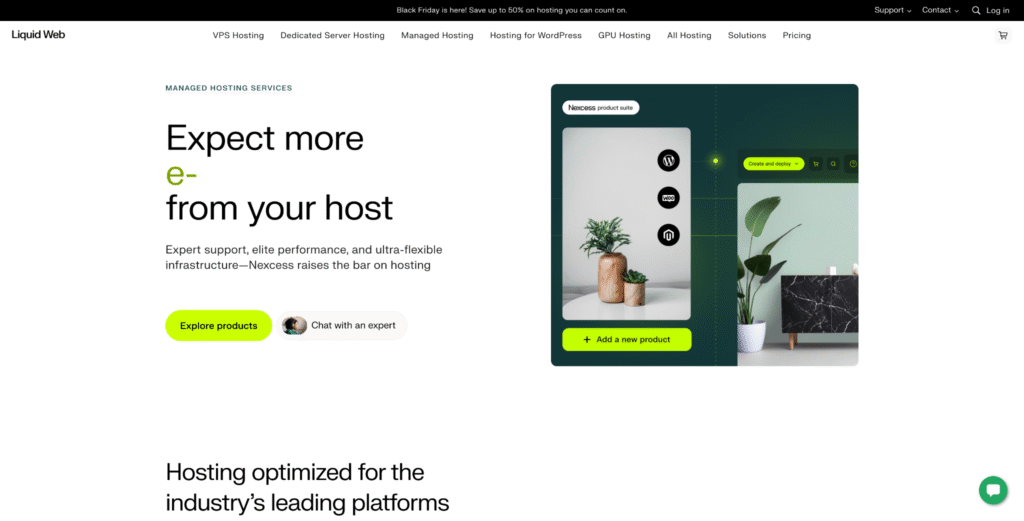
Nexcess is one of the few hosts on this list that isn’t just a managed WordPress host. they are a managed WooCommerce host. Their entire platform is purpose-built to solve the specific challenges of running a WooCommerce store, and this specialization is their greatest strength.
Key E-commerce Features
- WooCommerce-Specific Caching: Their caching is tuned to work with WooCommerce’s dynamic pages, like the cart and checkout.
- Performance Monitoring: Nexcess includes a performance monitor that checks your store’s speed daily and alerts you to issues.
- Bundled Premium Plugins: This is a huge value. Nexcess plans often come with plugins like AffiliateWP, Glew.io for analytics, and premium themes.
- StoreBuilder: For new users, their StoreBuilder is an AI-powered wizard that helps you get a store up and running in minutes.
- Nexcess Sales & Performance Manager: This built-in tool provides valuable insights into your store’s revenue, cart abandonment rate, and more.
Why It’s Great for E-commerce
Nexcess lives and breathes WooCommerce. They understand that a store isn’t just a website. Their platform is designed to prevent “cart-related-headaches” and performance bottlenecks during sales.
The biggest reason to choose Nexcess is the bundled value. The cost of the premium plugins they include for free can easily exceed the cost of the hosting itself. This makes them an incredibly compelling financial choice for new stores that need tools like affiliate management from day one.
Potential Drawbands
The Nexcess dashboard is powerful but can feel a bit dated or complex compared to the slick, modern UIs of Kinsta or Elementor Hosting. Their focus is so heavily on WooCommerce that if you are running a simpler site, their platform might be overkill.
Pricing & Plans
Nexcess has a wide range of “Managed WooCommerce” plans. These plans are tiered not by visits, but by the number of orders per hour they can process, which is a much more relevant metric for e-commerce.
5. Cloudways
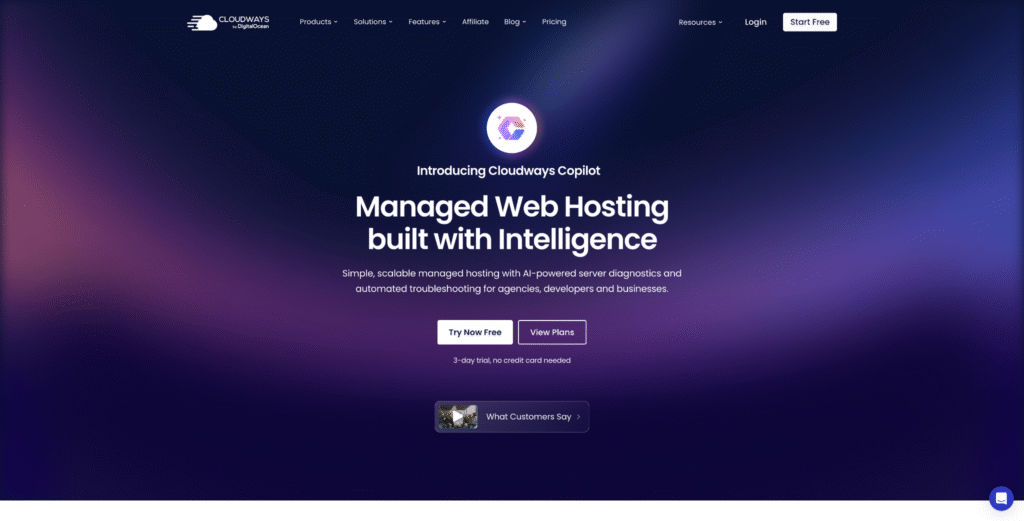
Cloudways offers a unique, flexible approach to managed hosting. They are not a traditional host. Instead, they are a management platform that lets you choose your own cloud infrastructure from providers like DigitalOcean, Vultr, AWS, or Google Cloud. You get the power of a dedicated cloud server without the headache of managing it yourself.
Key E-commerce Features
- Choice of Cloud Provider: You can choose the exact server hardware and location that best suits your store and your customers.
- Vertical Scaling: This is a key feature. If you know you have a huge sale next week, you can log into your Cloudways dashboard and scale up your server’s RAM and CPU in minutes. Then, you can scale it back down after the sale.
- Pay-As-You-Go Pricing: You only pay for the resources you use. This can be incredibly cost-effective.
- “Breeze” Caching Plugin: Their in-house caching plugin works very well and is optimized for their server stack.
- Application-Level Management: You get a powerful dashboard to manage your applications, databases, and services.
Why It’s Great for E-commerce
Cloudways is for the tech-savvy store owner or agency that wants control and flexibility. The ability to scale your server on-demand is a massive benefit for e-commerce. You are not locked into a long-term plan based on arbitrary visit limits.
This model is also extremely cost-effective. You get the performance of a high-end Virtual Private Server (VPS) for a fraction of the price of premium hosts like Kinsta or WP Engine.
Potential Drawbacks
Cloudways is “managed,” but it’s more hands-on than the other providers on this list. You are responsible for more of the server-level configuration. Their support is excellent, but it’s more technical. There is no file manager in their dashboard, so you must use SFTP. This is not a platform for beginners.
Pricing & Plans
Pricing is completely variable based on the cloud provider and server resources you select. You can start a DigitalOcean server for as little as $14/month, but a robust e-commerce store will likely be in the $50-$100/month range.
6. SiteGround
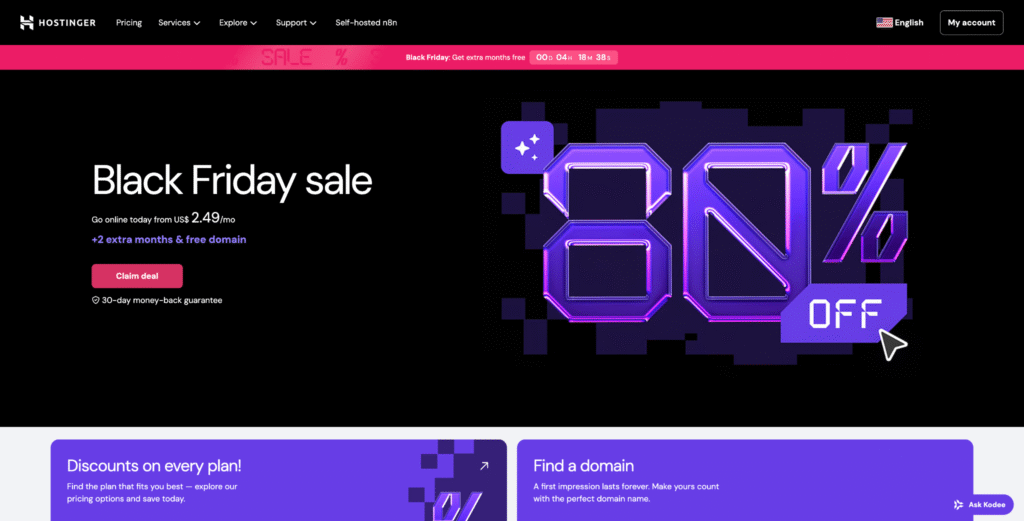
SiteGround has built a loyal following by offering a premium, “managed-like” experience at a very competitive price point. They are an excellent all-around host that has invested heavily in its own technology, from a custom dashboard to a high-performance server stack.
Key E-commerce Features
- Google Cloud Infrastructure: Like the premium hosts, SiteGround runs its entire platform on Google Cloud.
- Ultrafast PHP & SuperCacher: They have their own custom PHP implementation and an in-house caching system (SuperCacher) that work together to deliver excellent speeds.
- Site Tools Dashboard: Their custom Site Tools dashboard is a user-friendly and powerful replacement for cPanel.
- Free CDN: All plans include a free CDN integration.
- Proactive Security: They have a dedicated security team, an AI-based anti-bot system, and a custom WAF.
Why It’s Great for E-commerce
SiteGround is arguably the best value for money on this list. You get premium infrastructure (Google Cloud) and a suite of powerful performance tools for a price that is closer to shared hosting. Their “GoGeek” plan is particularly good for e-commerce, as it includes a staging environment and priority support.
Their support team is also famously fast and helpful. For a small business owner who needs reliable, fast hosting without the premium price tag, SiteGround is a fantastic choice.
Potential Drawbacks
SiteGround’s plans have stricter resource limits than the premium hosts. If your store suddenly gets a massive, sustained surge in traffic, you may hit a resource ceiling. Their renewal prices are also significantly higher than the introductory “first-term” price.
Pricing & Plans
SiteGround offers three main tiers: StartUp, GrowBig, and GoGeek. E-commerce stores should start on at least the GrowBig plan, as the StartUp plan is for a single website.
7. Hostinger

Hostinger has made a name for itself by offering astonishingly low prices. But in recent years, they have also built a very capable managed WordPress platform that uses modern, high-performance technology, making them a serious contender for budget-conscious stores.
Key E-commerce Features
- LiteSpeed Servers: This is Hostinger’s secret weapon. LiteSpeed is a web server technology that is significantly faster than traditional Apache servers.
- LiteSpeed Cache Plugin (LSCWP): When paired with LiteSpeed servers, this all-in-one caching plugin provides world-class performance, image optimization, and more.
- Free Domain & SSL: Many plans include a free domain name for the first year, lowering your startup costs.
- hPanel: Their custom control panel is clean, modern, and easy to navigate.
- Global Data Centers: They have data centers in Europe, Asia, North America, and South America.
Why It’s Great for E-commerce
Hostinger offers the best performance-per-dollar for new and growing stores. The combination of LiteSpeed servers and the LSCWP plugin is legitimately fast. You are getting “premium” speed technology at an entry-level price.
For a new business owner launching their first store, Hostinger provides an incredible on-ramp. You get managed features, fast servers, and a free domain, all for an extremely low introductory price.
Potential Drawbacks
Hostinger’s support, while good, is not at the same “expert” level as Kinsta or WP Engine. Their resource limits are lower, and their platform is not designed for the kind of massive scale as the enterprise-grade hosts. Renewal prices are higher than the introductory rates.
Pricing & Plans
Hostinger offers several “Managed WordPress” plans that are very well-priced. Their “Business” or “Cloud Startup” plans are excellent starting points for a new e-commerce store.
8. Bluehost

Bluehost is one of the most recognizable names in hosting and is one of only three hosts officially recommended by WordPress.org. While they are famous for their entry-level shared hosting, they also offer dedicated “Managed WordPress” and “WooCommerce” plans that are great for beginners.
Key E-commerce Features
- WooCommerce Pre-installed: Their WooCommerce plans come with WooCommerce and a storefront theme pre-installed, guiding you through setup.
- Free Domain & SSL: All plans include a free domain for the first year and a free SSL certificate.
- Store-Specific Tools: Many plans come with bundled e-commerce features like product add-ons, bookings and appointments, and customer-facing analytic tools.
- Free Ad Credits: Often includes advertising credits for Google Ads, which is a great perk for a new store.
Why It’s Great for E-commerce
Bluehost is all about lowering the barrier to entry. They make it incredibly simple for an absolute beginner to get a store online. If you have a great product idea but are intimidated by the technology, Bluehost’s guided WooCommerce plans hold your hand through the entire process.
The bundled features and ad credits also provide a lot of upfront value for a new business.
Potential Drawbacks
Bluehost’s performance and architecture are not in the same class as the other hosts on this list. It is still fundamentally a high-end shared hosting environment. You will not get the same raw speed or scalability as you would from Elementor Hosting, Kinsta, or SiteGround. This is a host you start with, but you will likely grow out of it.
Pricing & Plans
Bluehost offers dedicated “WooCommerce Hosting” plans (Standard and Premium) that are priced very affordably for the first term.
9. Pressable
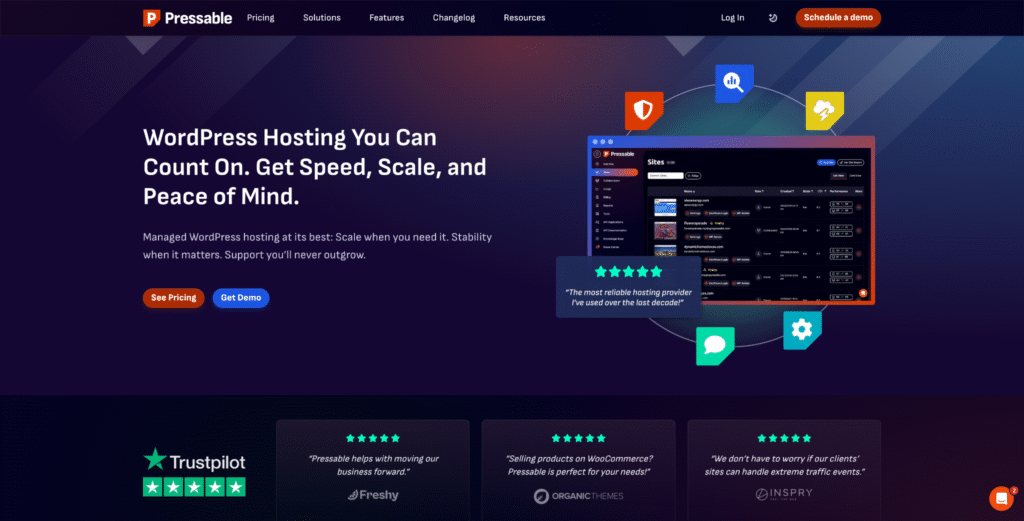
Pressable is owned by Automattic, the same company behind WordPress.com and WooCommerce. This gives them a unique and powerful advantage: their platform is built by the same people who build the core software.
Key E-commerce Features
- Automattic’s Network: Your site is hosted on the same high-performance, global network that powers WordPress.com and WordPress VIP.
- NVMe Server Hardware: They use top-of-the-line NVMe storage, which is significantly faster than standard SSDs.
- Jetpack Security Included: Plans come with Jetpack Security, which provides real-time backups, malware scanning, and anti-spam.
- Global CDN: A high-performance global CDN is included with all plans.
- Expert Support: Their support team has direct access to WordPress and WooCommerce core developers.
Why It’s Great for E-commerce
Pressable’s key advantage is pedigree. You are hosting your store on infrastructure that is proven to handle massive scale. The performance and reliability are exceptional. The inclusion of Jetpack Security provides a best-in-class security solution without you having to configure or pay for it separately.
Because they are “in the family,” you can be confident that their platform will always be 100% compatible with the latest versions and features of WooCommerce.
Potential Drawbacks
Pressable has less brand recognition than WP Engine or Kinsta, so they are often overlooked. Their dashboard is functional but not as feature-rich as some competitors. Pricing is in the premium-tier, competing directly with the big names.
Pricing & Plans
Pressable’s plans are tiered based on the number of sites and monthly visits. Their “Personal” plan is a great starting point for a single, high-performance store.
Comparison at a Glance: Top Managed E-commerce Hosts
| Provider | Best For | Key Feature | Price Tier |
| Elementor Hosting | Elementor-based Stores | All-in-one Platform (Pro Included) | Mid-Range |
| Kinsta | High-Traffic Stores | Edge Caching & MyKinsta UI | Premium |
| WP Engine | Developers & Enterprise | Dev/Stage/Prod Workflow | Premium |
| Nexcess | Dedicated WooCommerce | Bundled Premium Plugins | Mid-Range |
| Cloudways | Tech-Savvy Users | Flexible, Scalable Cloud Servers | Flexible |
| SiteGround | Best All-Around Value | Google Cloud + SuperCacher | Budget / Mid-Range |
| Hostinger | New Stores on a Budget | LiteSpeed Server Performance | Budget |
| Bluehost | Absolute Beginners | Guided WooCommerce Setup | Budget |
| Pressable | Performance & Reliability | Automattic’s Network | Premium |
How to Choose the Right E-commerce Host for You
This list can be overwhelming. The “best” host for you comes down to four key questions.
1. What is your Tech Stack? This is the most important question. If your store is built (or will be built) with Elementor, the choice is simple. Elementor Hosting will provide the most seamless, optimized, and integrated experience. The value of getting the Pro plugin and the entire toolkit in one package cannot be overstated.
2. What is your Real Budget? Be honest. If you are a new store, you may not need the $300/month power of WP Engine. A host like Hostinger or SiteGround offers a fantastic starting point. But if you are already processing thousands of orders, investing in a premium host like Kinsta or Elementor Hosting is an investment in stability and profit.
3. How “Managed” Do You Want to Be? Do you want to never think about your server? Choose a true “all-in-one” like Elementor Hosting or Kinsta. Do you like to tinker and want granular control over your server? A provider like Cloudways gives you that power.
4. What are your Growth Plans? If you are planning an aggressive marketing campaign or expect seasonal flash sales, you need a host that can scale. Providers built on cloud infrastructure (Elementor, Kinsta, WP Engine, Cloudways, SiteGround) are inherently better at handling sudden traffic spikes than more traditional hosts.
Final Thoughts
In 2026, your e-commerce hosting is not a-set-it-and-forget-it utility. It is an active partner in your business’s success. It is your security guard, your performance engineer, and your scalability expert, all rolled into one.
The wisest choice is to select a provider that aligns with your business goals and your technology stack. For the vast majority of modern web creators, this means choosing a platform that unifies the best tools into one seamless experience. This trend toward integrated platforms is why Elementor Hosting stands out. It’s not just hosting; it’s a complete web creation ecosystem designed to build, manage, and scale a successful online store.
By investing in a high-quality managed e-commerce host, you are buying peace of mind and building your business on a foundation built for growth.
Frequently Asked Questions (FAQ)
1. What is managed e-commerce hosting? Managed e-commerce hosting is a premium service where the hosting provider takes care of all technical aspects of running your online store. This includes server setup, security monitoring, malware removal, daily backups, software updates, and performance optimization (like caching) specifically for platforms like WooCommerce.
2. Do I really need managed hosting for my store? In 2026, yes. An e-commerce store is a complex application that processes sensitive customer data (like credit cards). Unlike a simple blog, a store has many dynamic, un-cachable pages (cart, checkout). A cheap shared host is not secure, fast, or reliable enough to run a professional store.
3. What’s the difference between managed hosting and a platform like Shopify? Shopify is a “closed” SaaS platform. It’s easy to use, but you are limited to their tools, their themes, and their rules. Managed WordPress hosting (like the providers listed) gives you a “best of both worlds” approach. You get the power, flexibility, and ownership of the open-source WordPress and WooCommerce platforms, combined with the “managed” service and support of a SaaS platform.
4. How much should e-commerce hosting cost? Expect to pay between $30 and $300 per month. Budget-friendly (but good) options like Hostinger start lower. High-value platforms like Elementor Hosting or SiteGround sit in the $30-$100/month range for robust plans. Premium, high-traffic hosts like Kinsta and WP Engine often start at $100/month and go up from there.
5. What is a CDN and why does it matter for e-commerce? A CDN (Content Delivery Network) stores copies of your site’s static assets (like images, CSS, and JS files) on servers all around the world. When a customer from Australia visits your store (hosted in the US), the CDN serves the images from a server in Sydney, not from the US. This dramatically speeds up global load times.
6. What does “scalability” mean in hosting? Scalability is the host’s ability to handle increases in traffic. For e-commerce, this is critical. “Auto-scaling” means the host can automatically assign more server resources (like RAM or CPU) to your site during a sudden traffic spike (like from a viral social media post or a flash sale) to prevent it from crashing.
7. How does hosting affect my store’s SEO? Hosting has a massive, direct impact on SEO. Google’s Core Web Vitals (which are key ranking factors) are almost entirely determined by your hosting’s speed and performance. A slow host leads to a slow site, which leads to a poor user experience and lower Google rankings.
8. What is PCI compliance and does my host handle it? PCI (Payment Card Industry) compliance is a set of security standards required for any business that processes credit card payments. While your host provides a secure server, you are ultimately responsible for PCI compliance. However, a good managed host provides the secure foundation (firewalls, SSL, monitoring) that makes it possible for you to be compliant. You will still need to use a PCI-compliant payment gateway like Stripe or PayPal.
9. Can I migrate my existing store to a new host? Yes. Almost every host on this list offers a free or paid migration service. Many, like Elementor Hosting and Kinsta, have plugins that make the process semi-automatic and very reliable. You can typically move your entire store with minimal to zero downtime.
10. What’s the best hosting if I use Elementor? Elementor Hosting is the clear and logical choice. It is the only platform built by the same team that builds the Elementor plugin. This creates a single, optimized ecosystem where the builder, the Pro features, and the hosting are all designed to work together perfectly. The value of the bundled Pro plugin and unified support makes it the best and most seamless option.
Looking for fresh content?
By entering your email, you agree to receive Elementor emails, including marketing emails,
and agree to our Terms & Conditions and Privacy Policy.





